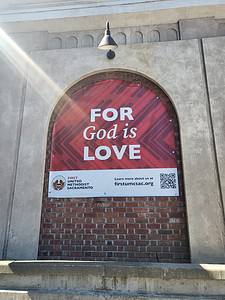Love? Why not money? Well, it is love and not money according to most popular songs. Few sing about money, although it is always on their mind…

People use the word ‘love’ in many situations to mean many things.
“I’m loving it,” says McDonald’s. Loving what: eating for the sake of eating, eating the burger for its nutrition, or eating a burger in the ambiance of a McDonald’s?
“God is love,” say a lot of Christians. So, God is not almighty since love cannot move mountains? “No, we meant to say that God is loving us and so should you.” That is one hell of a veiled demand…
It is surprisingly hard to say what one means and mean what one says. We do need a few liberties to get it right and have to count on forgiving listeners. Language is a thing of approximations and fuzziness. A word spoken after another can totally change the meaning of the first. There is a lot of slippage in language as there seems to be no fixed meaning to words after all.
Is love a property of the mind or of the world?
In other words, is love contingent on the presence of sentient and conscious humans or did love exist before Adam and Eve?
Is love a metaphoric description of an admirable quality of relationships or rather an emergent phenomenon of a burgeoning world, like life itself? Is ‘love’ not really a subjective construct, learned from experience?
‘Love’ and ‘loving,’ for sure, are at least two grammatical entries. One is a noun and the other a verb, respectively. One can say to another “I love you” without actually doing much of anything to or with that other. One can act ‘lovingly’ to another without being afflicted by any personal feelings other than those of duty or obligation.
The distinctness of human desire is that it can take as its object something no other animal desire does: another’s desire.
Readings on Hegel
Much has been produced about love − in speech and writing and theatre and film. A single paragraph of what love is or does not seem to be is impossible to pen. We can only talk about love, and try again and again. Yet, we all seem to yearn not so much to love but to be loved. And our promises to be loving may just be a cover for our hidden desires to be loved.
This ‘thing called love,’ as singer Bonny Raid has called it out, goes deep in and out of our psyche. Tina Turner’s famous song ‘What’s love but a second-hand emotion’ speaks to that. ‘Being in love’ is a truly blissful state, but when love sours − and who cannot imagine a cause for that − the situation becomes quickly a tragedy of tragedies.
Love and sex do not mix very well
What I want from you is you to want me.
Jeder
It is no wonder that so many people, even in the post-romantic, modern West, disavow love, that is, the love inherent in the involuntary and passionate states of ‘falling in love’ and ‘being in love,’ and rather agree to act ‘lovingly’ with each other, even if rather impassionately. That should qualify, after all, as what Jesus commanded.
Some societies and cultures, especially in Asia, do not have much of a romantic tradition; in those societies, marriage is largely understood as a social transaction. Passionate, romantic, or amorous love between a man and a woman can be less socially acceptable than the sexual desire we all seem to encounter onwards from the days of puberty.
But sexual desire is not to be mistaken for love. People go to the altar to confess their love to one another. But they see a priest in a booth to confess their sexual desires and transgressions to exchange repentance and penance for atonement.
What is my or your take on love?

It all depends on one’s desire, subsequent perspectives, or chosen contexts. On the surface, it is first and foremost just a word used as a metaphor, a figure of speech. More specifically, it is a top-level linguistic signifier capable of signifying a surprising variety of notions − from the impetus to fixing old cars or feeding hungry pets to cherishing memories of the past to believing in non-human deities, as well as experiencing rewarding relationships with living people, etc. And so, speakers and writers of love may deserve a few liberties when trying to say what they mean and mean what they say. Love, to some, proves to be ineffable.
I admit that for the longest time, I believed that love is an emergent phenomenon of the world that is nevertheless contingent on at least two conscious, alive humans. I was supposed to be one of such a set, comprised of a male and a female, that is. I still believe that human beings are defined by their desire for recognition and that such desire can be satisfied only by another person who is one’s equal.
If such desire for recognition, in its multitude of facets, is reciprocally satisfied over time, one might very well evaluate or signify that relationship as ‘love.’
If it isn’t love, it will have to do ’til the real thing comes along
Without love, it would be hard to experience life as worth living. As French psychoanalyst Jacques Lacan pointed out in his theory of the Mirror Stage, the mother’s ‘favorable’ gaze is one of the first and perhaps most important sensations for a baby to internalize. Babies may already perceive if they are wanted and are loved, or not, or how.
Does a mother have mixed feelings about the arrival of the baby, and/or does she love it unconditionally? Is the mother conflicted, or ecstatic about the baby? I must have gotten a boatload of love from my mother, that is, not just the proverbial cake, but a cake with the proverbial cherry on top. Mom and I existed undisturbed in seemingly eternal harmony − until my dad passed away early in his life and she had to marry again.

Life is cruel, say many. And love is treacherous. At least it can be so. But my first experience with love, my mother’s love, started off on the right foot, or breast − so to speak. That love became the cornerstone of my subsequent life and my general optimistic disposition. Strange enough, though, it also became the ‘object cause of desire,’ another of Lacan’s speculative concepts. Because even a mother’s perfect love gets eventually lost, necessarily so, my life script came to reflect my search for existential love.
Freud’s and Lacan’s psychoanalytics are hard to comprehend. I recommend that interested folks start reading the fabulous book Scripts People Life by Claude Steiner. This is material consistent with Transactional Analysis, a form of modern psychology that examines a person’s relationships and interactions as developed by Eric Berne.
In conclusion, ‘love does seem to make the world go ’round.’ The phrase is perhaps good enough to be entertaining the busy common folks. But for people stuck, let’s say in rather mundane or unfulfilling relationships or careers, and seeking change, reading up on all-things-love is probably beneficial.

